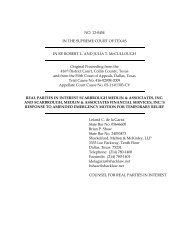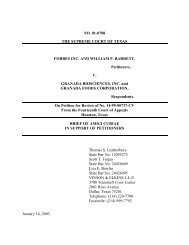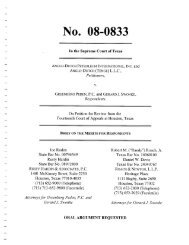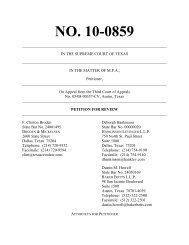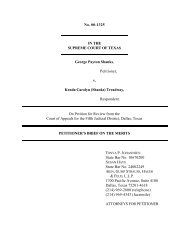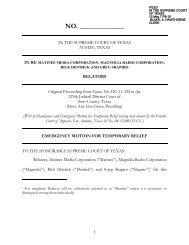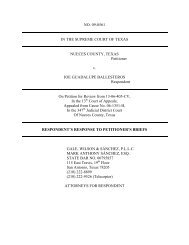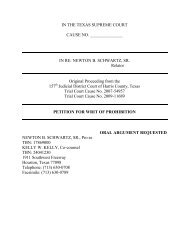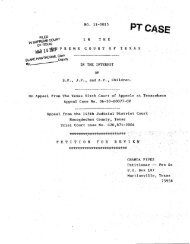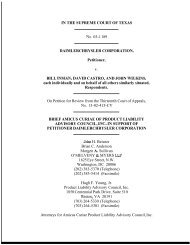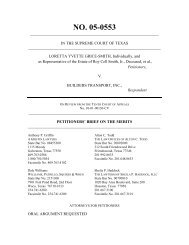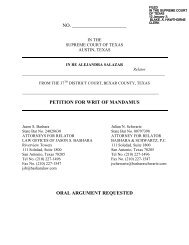DRAFT 2 Brief on the merits - Supreme Court of Texas
DRAFT 2 Brief on the merits - Supreme Court of Texas
DRAFT 2 Brief on the merits - Supreme Court of Texas
Create successful ePaper yourself
Turn your PDF publications into a flip-book with our unique Google optimized e-Paper software.
not about <strong>the</strong> invocati<strong>on</strong> <strong>of</strong> judicial process before moving to compel arbitrati<strong>on</strong>—it is<br />
about a complete failure to initiate arbitrati<strong>on</strong> after a court has ordered <strong>the</strong> parties to<br />
arbitrate. The cases Heritage relies up<strong>on</strong> are not <strong>on</strong> point.<br />
A party can forfeit its right to arbitrate through ei<strong>the</strong>r acti<strong>on</strong> or inacti<strong>on</strong>. Futurewei<br />
Techs. Inc. v. E. Oliver Capital Group, LLC, No. 4:09CV455, 2011 U.S. Dist. LEXIS<br />
39080 at *4 (E.D.T.X. [Sherman Div.] April 11, 2011)(mem. op.). Cases discussing<br />
waiver based up<strong>on</strong> <strong>the</strong> invocati<strong>on</strong> <strong>of</strong> judicial processes pertain to forfeiture <strong>of</strong> <strong>the</strong> rights<br />
to arbitrate caused by acti<strong>on</strong>. C<strong>on</strong>versely, <strong>the</strong> present matter pertains to forfeiture <strong>of</strong> <strong>the</strong><br />
right to arbitrate caused by inacti<strong>on</strong>.<br />
Heritage did not forfeit its right to arbitrate because <strong>of</strong> its acti<strong>on</strong>s. It forfeited its<br />
right to arbitrate by doing nothing for four years.<br />
1. Heritage’s Inacti<strong>on</strong> C<strong>on</strong>stitutes Default<br />
The United States District <strong>Court</strong> for <strong>the</strong> Eastern District <strong>of</strong> <strong>Texas</strong> (Sherman<br />
Divisi<strong>on</strong>) recently c<strong>on</strong>sidered a matter similar to <strong>the</strong> <strong>on</strong>e presented herein.<br />
See<br />
Futurewei, 2011 U.S. Dist. LEXIS 39080. After <strong>the</strong> defendants, who had initially moved<br />
to compel arbitrati<strong>on</strong>, refused to arbitrate, <strong>the</strong> court found that “dilatory c<strong>on</strong>duct by<br />
Defendants c<strong>on</strong>stitutes a default in proceeding with <strong>the</strong> arbitrati<strong>on</strong> and warrants vacating<br />
<strong>the</strong> order staying <strong>the</strong> case and referring <strong>the</strong> matter to arbitrati<strong>on</strong>.” Id. at *6. The court<br />
vacated its order referring <strong>the</strong> case to arbitrati<strong>on</strong> and ultimately granted default judgments<br />
against <strong>the</strong> defendants. Id. at *8 and Futurewei Techs. Inc. v. E. Oliver Capital Group,<br />
LLC, No. 4:09CV455, 2011 U.S. Dist. LEXIS 53826 (E.D.T.X. [Sherman Div.] May 19,<br />
2011)(mem. op.). Because <strong>the</strong> defendants in Futurewei defaulted in arbitrati<strong>on</strong> under 9<br />
4



